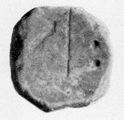CO·19
| Inscription | |
|---|---|
| Reading in transliteration: | ]u : [ |
| Reading in original script: | ] |
|
| |
| Object: | CO·19 Rondineto (unidentifiable) |
| Position: | unknown |
| Direction of writing: | ambiguous |
| Script: | perh. North Italic script |
| Number of letters: | 1–2 |
| Number of words: | 1 |
| Number of lines: | 1 |
| Workmanship: | scratched after firing |
| Condition: | damaged |
|
| |
| Archaeological culture: | Golasecca III A [from object] |
| Date of inscription: | 5th–early 4th c. BC [from object] |
|
| |
| Type: | unknown |
| Language: | unknown |
| Meaning: | unknown |
|
| |
| Alternative sigla: | Solinas 1995: 94 q Morandi 2004: 166 |
|
| |
| Sources: | Morandi 2004: 631 f. |
Images
Commentary
Image in Tibiletti Bruno 1969b: 286, tav. XIV.36 (photo).
Two lines and two round holes preserved on the fragment. Tibiletti Bruno 1969b: 212, no. 36 reads, in different directions, ]: k[, ]: is[ or ]si :[ (with the two holes plus a possible third one above by the breaking edge), but the leftmost scratch does not make for a convincing letter (or part of one). Morandi instead reads a single upsilon (]: u[, cf. the drawing of Solinas, who gives no reading), but the two lines do not seem to be connected; numerous other reading options in different orientations and directions are possible (alpha, pi, lambda). Morandi notes that a separator would be an unicum in the graffiti from Como and points to a longer inscription, but it seems to me that the fragment is of a foot and there would not have been space for any other letters. More likely that the holes have a different function, and the scratches are a para-script mark.

